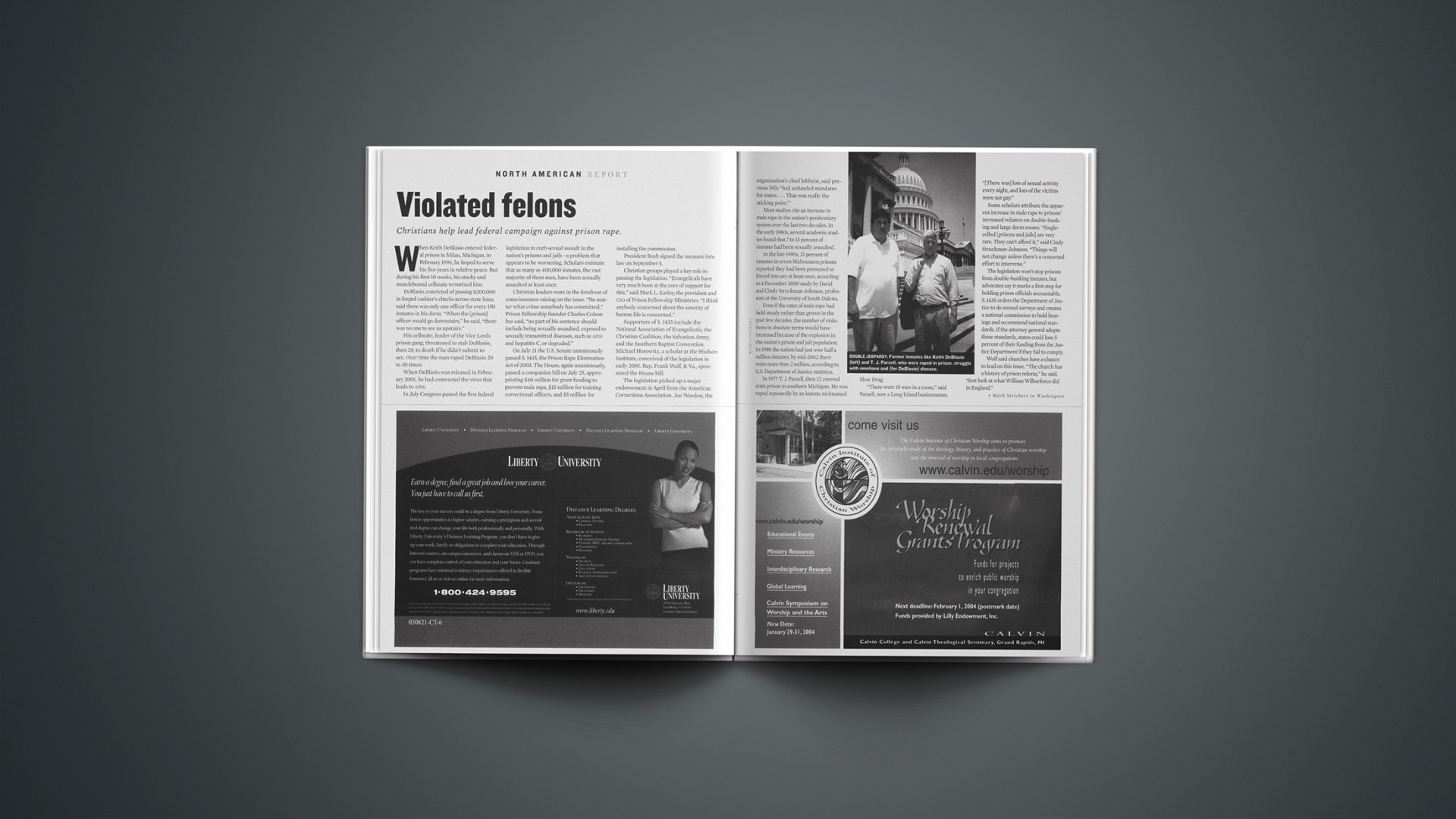When Keith DeBlasio entered federal prison in Milan, Michigan, in February 1996, he hoped to serve his five years in relative peace. But during his first 10 weeks, his stocky and musclebound cellmate terrorized him.
DeBlasio, convicted of passing $200,000 in forged cashier’s checks across state lines, said there was only one officer for every 150 inmates in his dorm. “When the [prison] officer would go downstairs,” he said, “there was no one to see us upstairs.”
His cellmate, leader of the Vice Lords prison gang, threatened to stab DeBlasio, then 28, to death if he didn’t submit to sex. Over time the man raped DeBlasio 20 to 30 times.
When DeBlasio was released in February 2001, he had contracted the virus that leads to AIDS.
In July Congress passed the first federal legislation to curb sexual assault in the nation’s prisons and jails—a problem that appears to be worsening. Scholars estimate that as many as 400,000 inmates, the vast majority of them men, have been sexually assaulted at least once.
Christian leaders were in the forefront of consciousness-raising on the issue. “No matter what crime somebody has committed,” Prison Fellowship founder Charles Colson has said, “no part of his sentence should include being sexually assaulted, exposed to sexually transmitted diseases, such as AIDS and hepatitis C, or degraded.”
On July 21 the U.S. Senate unanimously passed S. 1435, the Prison Rape Elimination Act of 2003. The House, again unanimously, passed a companion bill on July 25, appropriating $40 million for grant funding to prevent male rape, $15 million for training correctional officers, and $5 million for installing the commission.
President Bush signed the measure into law on September 4.
Christian groups played a key role in passing the legislation. “Evangelicals have very much been at the core of support for this,” said Mark L. Earley, the president and CEO of Prison Fellowship Ministries. “I think anybody concerned about the sanctity of human life is concerned.”
Supporters of S. 1435 include the National Association of Evangelicals, the Christian Coalition, the Salvation Army, and the Southern Baptist Convention. Michael Horowitz, a scholar at the Hudson Institute, conceived of the legislation in early 2001. Rep. Frank Wolf, R-Va., sponsored the House bill.
The legislation picked up a major endorsement in April from the American Corrections Association. Joe Weedon, the organization’s chief lobbyist, said previous bills “had unfunded mandates for states… . That was really the sticking point.”
Most studies cite an increase in male rape in the nation’s penitentiary system over the last two decades. In the early 1980s, several academic studies found that 7 to 15 percent of inmates had been sexually assaulted.
In the late 1990s, 21 percent of inmates in seven Midwestern prisons reported they had been pressured or forced into sex at least once, according to a December 2000 study by David and Cindy Struckman-Johnson, professors at the University of South Dakota.
Even if the rates of male rape had held steady rather than grown in the past few decades, the number of violations in absolute terms would have increased because of the explosion in the nation’s prison and jail population. In 1980 the nation had just over half a million inmates; by mid-2002 there were more than 2 million, according to U.S. Department of Justice statistics.
In 1977 T. J. Parsell, then 17, entered state prison in southern Michigan. He was raped repeatedly by an inmate nicknamed Slow Drag.
“There were 18 men in a room,” said Parsell, now a Long Island businessman. “[There was] lots of sexual activity every night, and lots of the victims were not gay.”
Some scholars attribute the apparent increase in male rape to prisons’ increased reliance on double-bunking and large dorm rooms. “Single-celled [prisons and jails] are very rare. They can’t afford it,” said Cindy Struckman-Johnson. “Things will not change unless there’s a concerted effort to intervene.”
The legislation won’t stop prisons from double-bunking inmates, but advocates say it marks a first step for holding prison officials accountable. S. 1435 orders the Department of Justice to do annual surveys and creates a national commission to hold hearings and recommend national standards. If the attorney general adopts those standards, states could lose 5 percent of their funding from the Justice Department if they fail to comply.
Wolf said churches have a chance to lead on this issue. “The church has a history of prison reform,” he said. “Just look at what William Wilberforce did in England.”
Copyright © 2003 Christianity Today. Click for reprint information.
See Christianity Today‘s earlier item, “Prison Rape Is No Joke” (July 9, 2002).
The Library of Congress’s Thomas site offers the full text of the bill in plain text and PDF formats and more information on what is now Public Law No. 108-79.
Charles Colson, who lobbied for the bill, devoted a recent Breakpoint radio commentary to its passage.
President Bush’s comments in signing the bill were rather matter-of-fact.
Excellent resources on prison rape and the efforts to stop it are available from Human Rights Watch and Stop Prisoner Rape. Some of the most disturbing items are clearly labeled.
Editorials and columns supporting the bill appeared in The Washington Post, Boulder [Colo.] Daily Camera, The Cincinnati Enquirer, St. Petersburg Times, Mobile Register, National Review Online (x2).
Breakpoint‘s Anne Morse examined prison rape for World magazine in 2001.










